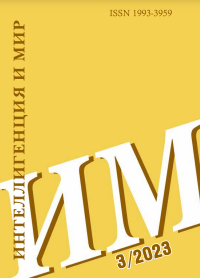Политические идеи российских эмигрантов в 1920-1930-е гг. Рец. на кн.: Базанов П. Н. Царь и Советы: русская эмиграция в борьбе за российскую государственность: политическая и издательская деятельность
Political ideas of Russian emigrants in the 1920s-1930s. Review on the book: Bazanov P. N. Tsar and Soviets: Russian emigration in the struggle for Russian statehood: political and publishing activities
Author(s): Liudmila V. KlimovichSubject(s): Political history, Social history, Interwar Period (1920 - 1939), Book-Review, Migration Studies, Asylum, Refugees, Migration as Policy-fields
Published by: Ивановский государственный университет
Keywords: Russian emigration; post-revolutionary movements; Russia abroad; Young Russians; Smenovekhites;
Summary/Abstract: The review considers the monograph by P. N. Bazanov “The Tsar and the Soviets: Russian emigration in the struggle for Russian statehood: political and publishing activities”. Petr Nikolaevich Bazanov is the author of several hundred publications on the history of Russian emigration of the XX century, Doctor of Historical Sciences, professor, professor at the St. Petersburg Institute of Culture. The monograph under review is the logical conclusion of a series of publications devoted to the post-revolutionary movements of the Russian emigration and their publishing activities in the 1920s-1930s in Europe. The classification of post-revolutionary organizations is based on the principle of ideological views and attitudes towards Soviet power. The book shows the process of formation of such organizations as Smenovekhists, post-revolutionaries, Young Russians. Much attention is paid to the periodicals of post-revolutionary organizations in the monograph. They were the mouthpiece of the movements, reflecting their ideological views and spreading ideas among the emigrants. A feature of the work was the detailed and informative section “Notes”, which, in terms of content and completeness, claims to be a separate chapter. Extensive biographical information and references to sources and literature leave the most favorable impression of the work. Another positive feature of the book is a carefully designed scientific reference apparatus. The problem of the relationship of the studied movements to the impending world war is especially noted. The author fits each movement into a historical context, showing the attitude towards fascism, and in general gives an assessment to which position of defencism or defeatism the members of the organizations under study gravitated. The monograph is replete with interesting materials from the Archive of the Russian Diaspora of the Cultural Center of the House-Museum of Marina Tsvetaeva, the Archive of the Office of the Federal Security Service of the Russian Federation for St. Russian Diaspora of the Russian National Library, Department of Russian Abroad Funds of the State Public Library, Russian State Military Archive, Manuscript Department of the Institute of Russian Literature, V. S. Obolensky, which were little known to readers. It is also organically complemented by a list of sources and references, a detailed name index, which greatly facilitates the work with a scientific publication. The importance and usefulness of the monograph under review is beyond doubt.
Journal: Интеллигенция и мир
- Issue Year: 2023
- Issue No: 3
- Page Range: 157-169
- Page Count: 13
- Language: Russian

